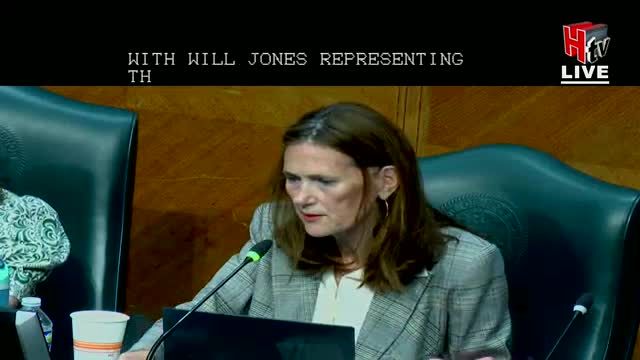Houston to hold proposed tax rate steady; staff outlines fee options used by other Texas cities
October 07, 2025 | Houston, Harris County, Texas
This article was created by AI summarizing key points discussed. AI makes mistakes, so for full details and context, please refer to the video of the full meeting. Please report any errors so we can fix them. Report an error »

Houston — The Budget & Fiscal Affairs Committee heard on Oct. 20 that the city will propose keeping its property tax rate unchanged at 51.919¢ per $100 of valuation and that decision would leave the city about $53 million short of the budgeted property tax revenue for FY2026, requiring a drawdown of fund balance.
Melissa Dabowski, the city's finance director, told the committee the "prior year tax rate, which is our current proposed tax rate of 51.919¢," would generate an estimated $1,450,000,000 in property tax revenue and that the shortfall compared with the adopted budget is roughly $53,000,000. Dabowski said that with the proposed rate the city's projected ending fund balance would fall to about $321,500,000, or 12.66% of expenditures (excluding debt service and pay‑as‑you‑go capital).
Controller's office staff earlier presented two monthly snapshots with close but different fund balance estimates; Will Jones said the controller's monthly report projects an ending general‑fund balance of about $356,700,000 (14% of expenditures, excluding debt service and pay‑as‑you‑go) for FY2026, while the finance director's 2+10 projection showed $374,000,000. Dabowski explained differences reflect valuation and revenue timing and the budget assumptions used.
The committee also reviewed a staff comparison of other large Texas cities' revenue structures. The presentation noted Houston is the only large Texas city in the comparison that does not charge a residential garbage fee and that several peers receive substantial general‑fund transfers from municipally owned utilities. The finance office estimated, using a $33-per-household example and 415,000 households, a hypothetical solid‑waste fee could generate roughly $164,000,000 — a preliminary figure subject to the solid‑waste study now underway.
Committee members pressed staff on legal and technical limits. Members asked whether state law restricts transfers from enterprise funds; finance staff said those transfers often depend on local arrangements and, for some cities, on contract or covenant language tied to utility ownership and bond covenants. The presentation noted additional legal analysis would be required to determine whether Houston could replicate peer cities' utility transfers, and staff flagged that bond covenants could limit options.
Dabowski reminded the committee of the voter‑approved local revenue exceptions: Proposition 1 (2004) and Proposition H (2006). She summarized the statutory state cap changes from 2019 (Senate Bill 2) that reduced the state’s allowable maintenance-and-operations multiplier and explained that the city must compute multiple cap tests each year and adopt a rate compliant with the most restrictive test.
Council members asked about next steps. Dabowski said the city must present and publish tax calculations and that council will consider the tax rate at the required public hearing scheduled for the following day. Several council members urged staff to return with detailed legal analysis if the council wants to evaluate any fee or utility‑transfer options.
Provenance: The tax‑rate projection, fund‑balance impact, and peer‑city revenue comparisons are drawn from the finance director's and controller's presentations and the subsequent committee Q&A.
Melissa Dabowski, the city's finance director, told the committee the "prior year tax rate, which is our current proposed tax rate of 51.919¢," would generate an estimated $1,450,000,000 in property tax revenue and that the shortfall compared with the adopted budget is roughly $53,000,000. Dabowski said that with the proposed rate the city's projected ending fund balance would fall to about $321,500,000, or 12.66% of expenditures (excluding debt service and pay‑as‑you‑go capital).
Controller's office staff earlier presented two monthly snapshots with close but different fund balance estimates; Will Jones said the controller's monthly report projects an ending general‑fund balance of about $356,700,000 (14% of expenditures, excluding debt service and pay‑as‑you‑go) for FY2026, while the finance director's 2+10 projection showed $374,000,000. Dabowski explained differences reflect valuation and revenue timing and the budget assumptions used.
The committee also reviewed a staff comparison of other large Texas cities' revenue structures. The presentation noted Houston is the only large Texas city in the comparison that does not charge a residential garbage fee and that several peers receive substantial general‑fund transfers from municipally owned utilities. The finance office estimated, using a $33-per-household example and 415,000 households, a hypothetical solid‑waste fee could generate roughly $164,000,000 — a preliminary figure subject to the solid‑waste study now underway.
Committee members pressed staff on legal and technical limits. Members asked whether state law restricts transfers from enterprise funds; finance staff said those transfers often depend on local arrangements and, for some cities, on contract or covenant language tied to utility ownership and bond covenants. The presentation noted additional legal analysis would be required to determine whether Houston could replicate peer cities' utility transfers, and staff flagged that bond covenants could limit options.
Dabowski reminded the committee of the voter‑approved local revenue exceptions: Proposition 1 (2004) and Proposition H (2006). She summarized the statutory state cap changes from 2019 (Senate Bill 2) that reduced the state’s allowable maintenance-and-operations multiplier and explained that the city must compute multiple cap tests each year and adopt a rate compliant with the most restrictive test.
Council members asked about next steps. Dabowski said the city must present and publish tax calculations and that council will consider the tax rate at the required public hearing scheduled for the following day. Several council members urged staff to return with detailed legal analysis if the council wants to evaluate any fee or utility‑transfer options.
Provenance: The tax‑rate projection, fund‑balance impact, and peer‑city revenue comparisons are drawn from the finance director's and controller's presentations and the subsequent committee Q&A.
View full meeting
This article is based on a recent meeting—watch the full video and explore the complete transcript for deeper insights into the discussion.
View full meeting
